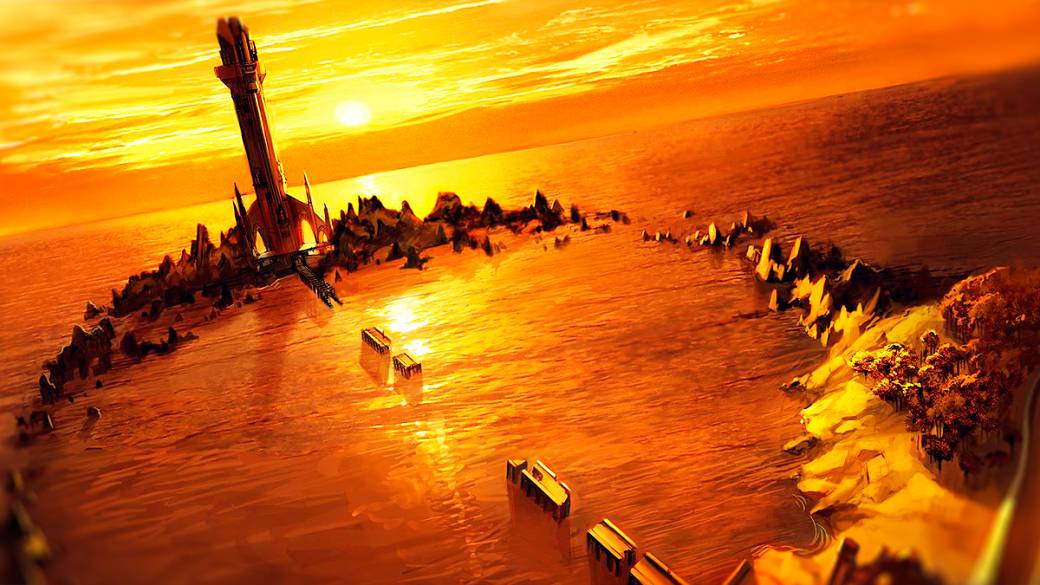
"Magic exists to serve man, and never rule over him," but what about the freedom of magicians?
Thedas has become an alternative home for the adventurers who save the world throughout the saga of the Dragon Age, whose fourth part in development we wait patiently. A convulsive world, where the human being, elves, qunaris and dwarves maintain a tense coexistence. Different regions, built on their own culture, coexist under a murky peace. BioWare built a universe away from the idealization of heroic fantasy, more channeled into a grimdark that shows, through the supernatural prism, a faithful and bitter portrait of our society. In Thedas there are socio-political problems such as inequality, racism, government intrigues, which continue and adapt to a greater threat, such as the Ruin or the Veil Gap. And one of the issues on which many of the conflicts between the inhabitants of Thedas revolve is a phenomenon as usual as it is dangerous: magic. Throughout the games we have met notable sorcerers such as Dorian, originally from Tevinter, an empire where magicians enjoy the greatest prestige and social domination; or Morrigan and Flemeth, the witches of the thicket that live outside the conventional opinions.
As everyday as another manifestation of nature, magic is a tool that can be manipulated to alter reality. This energy, mostly, originates in the Veil – the plane where the spirits live and where humans, qunaris and elves travel in dreams – and those trained to use it can extract and manipulate it. Without a doubt, it is a tool as useful as it is dangerous: exposure in the Veil makes the magician vulnerable to the spirits that inhabit it, which they can possess. This raised the need for an institution to guide sorcerers and, at the same time, establish control over the responsible use of magic. With this, the Circle of Wizards was born.
The magic instruction
Each region in Thedas has its own Circle, which, for the most part, is subject to the Chapel, the dominant religious organization and follower of the Song of Light, a compendium of teachings written by the prophetess Andraste. Thus, the objective of the Circle is to guide the magicians so that they develop their ability within ethical frameworks and, in turn, understand their own magic and the Veil to protect themselves against their dangers. The activity of the Circle is supervised by the Templars, the military arm of the Chapel in charge of pursuing prohibited magical practices, in addition to hunting the apostates, that is, sorcerers not attached to the Circle. Said military order has the right to execute the right of annulment, by order of the Chapel, which consists in passing by the sword to a Circle of Magicians whose members have been corrupted by the forbidden magic, event to which the schism of the Circle can end of Wizards of Ferelden in Dragon Age: Origins.
Magic is an exclusive discipline, for which it is necessary to have some innate talent before cultivating it. Normally, the magician manifests his ability in childhood, at which time he can enter the Circle. While some infants have been taken voluntarily, others have not had a say in that decision, as happened with the Kirkwall Circle and its radical praxis.
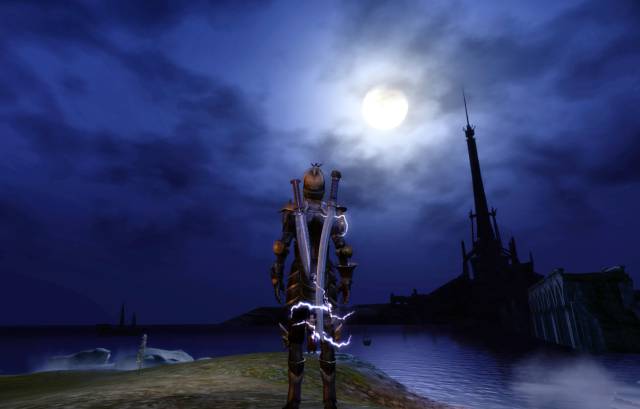 View of the Tower of the Circle of Magi in Ferelden (capture taken from Giant Bomb)
View of the Tower of the Circle of Magi in Ferelden (capture taken from Giant Bomb)
In Dragon Age: The World of Thedas (2013), David Gaider, main scriptwriter of the saga, recounts the process of initiation of a magician: the First Enchanter takes a few drops of his blood and saves them in a phylacteria, in order to locate him In case of leakage.
In the Circle, the magician faces his greatest test when he reaches adulthood: Anguish, around which the background story of Dragon Age: Origins revolves around if our Ferelden Hero is a sorcerer. Supervised by other veteran and Templar magicians, the apprentice enters the Veil through ingesting lily, a mineral that allows access to that plane. There, he must face a demon who will seek to possess him. If the sorcerer manages to defeat him, he will pass the test; otherwise it will become an abomination that will be executed immediately by their peers. The purpose of such an extreme ritual is, according to Gaider, "to distinguish the most skilled magic practitioners from those who are too weak or unstable to make responsible use of their gift."
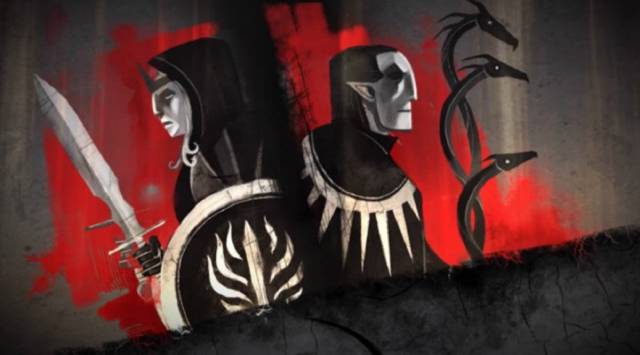 A sloth demon tempts a magician's apprentice during his anguish.
A sloth demon tempts a magician's apprentice during his anguish.
The disturbing Tranquility
Likewise, the possibility of being possessed by a demon remains a danger. In the face of temptation that is too insistent, the Circle proposes a solution as radical as it is fearsome: the Rite of Tranquility, through which the magician's link with the Veil is skewed, thus depriving him of all emotion that leads him to have desires that can be exploited. For a demon
In the codex The Tranquility and the role of the Veil in human culture, of the first charming Josephus, the quiet are described both in their strange way of being and in their role within the Circle: “The quiet, ironically, resemble the Sleepwalkers, because they are never fully awake or completely asleep. They are still part of our Circle, however, and some would even say they are the most crucial part. They have an incredible power of concentration because it is simply impossible to distract a quiet man, and this makes them susceptible to becoming artisans of such skill that they rival even the dwarf's mastery. The formari, the branch of the Circle devoted to the enchantment of objects, are composed exclusively of quiet and are the source of all the wealth that sustains our towers. ” This ritual is described within Dragon Age: The World of Thedas as a conflicting cause within the magicians themselves because of their dubious ethical nature: “While wizards who have not succumbed to the ritual consider horrible an empty existence of emotions, the calm they no longer have any feeling that pushes them to object ”.
The origin of a closed company
The Circle of Magicians, in each city, resides in a fortress that, generally, is in a place far from the city. His home is usually a vast building, in which hundreds of sorcerers and students live, which cover basic needs such as food, shelter and clothing.
The sorcerers' confinement, as well as the creation of the Circle itself, has its origin in the Val Royeaux revolt, documented by Sister Petrine, a Chapel scholar: “It is a truth known to all that there is no better way to get it A person does something to tell him not to. Unfortunately, the Chapel of the Divine Era has certain problems with the most obvious truths. Although magic does not outlaw – quite the contrary, because the Chapel relied on magic to light the eternal flame that burns in all the braziers of all the chapels – it has relegated the magicians to light candles and lamps. And perhaps to dust from the beams and eaves from time to time. (…) It absolutely did not surprise anyone when the wizards of Val Royeaux, in protest, extinguished the sacred flames of the cathedral and locked themselves in the choir. That is, no one except the Divine Ambrose II, who was outraged and tried to order an Exalted March against his own cathedral. Even her most devout Templars deterred her from this idea. For 21 days, the fires remained extinguished until the negotiations were carried out, according to the legend, shouted bare from the choir. The wizards were exiled delighted to a remote fortress outside the capital, where they would be guarded under the watchful eye of the Templars and a council of their own elder magicians. Outside of normal society, and outside the Chapel, magicians would form their own closed society, the Circle, separated for the first time in human history. ”
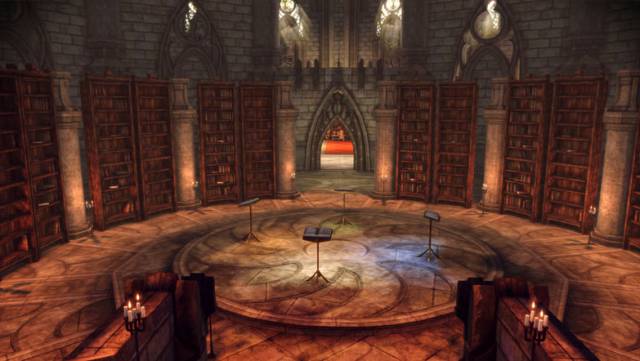 Ferelden Circle Tower Library in Ferelden
Ferelden Circle Tower Library in Ferelden
The hierarchy and fraternities of magic
As for the organization chart of the Circle, it follows a hierarchy inspired by the charges established by the magical societies of Tevinter, empire where magicians enjoy freedom and prestige. The great enchantress, the largest representative of the Circle, who directs the relationship with the Chapel and serves as advisor to the Divine, visible head of the religious institution; the first enchantress, leader of the Circle, who congregates with his counterparts in the College of Magicians of Cumberland (Nevarra) to choose a new great enchantress; the lovely seniors — the most experienced — and junior — who replace the former in case of absence and serve as staff managers; the lovely, tutors of the apprentices; and the magicians themselves, who have overcome anxiety.
As for politics, the Circle maintains a neutral position, except in the case of Ruin, where sorcerers serve the cause in favor of a global good. However, there are magicians who, united by the same ideological current, congregate in fraternities that fight for a more relevant role of magic at the governmental level. Documented by the first charming Josephus, these cliques are classified into the following:
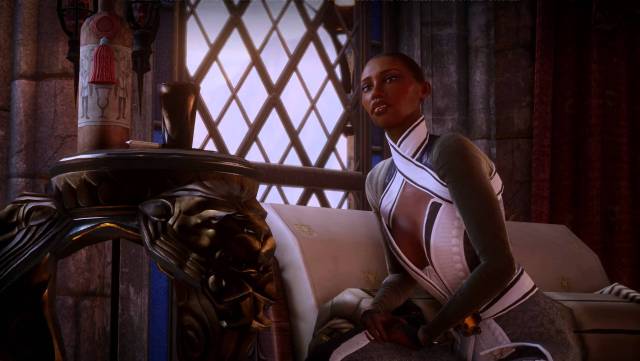 Vivienne, First Charming of Orlais and leader of the loyal magicians.
Vivienne, First Charming of Orlais and leader of the loyal magicians.
“- Loyalists, who advocate loyalty and obedience to the Chapel.
– The equitable, who defend temperance and follow a particular code of conduct to which they believe that all magicians must adhere.
– The libertarians, a growing fraternity that in public wants to retain more power for the circles but secretly advocates a complete excision of the Chapel, a dangerous position, of course.
– The isolationists, a small group that wants to be confined in distant territories to avoid conflicts with the populace in general.
– The lucrones, who argue that the Circle has to do first and foremost everything that is most profitable. They give priority to the accumulation of wealth, often followed by obtaining political influence. ”
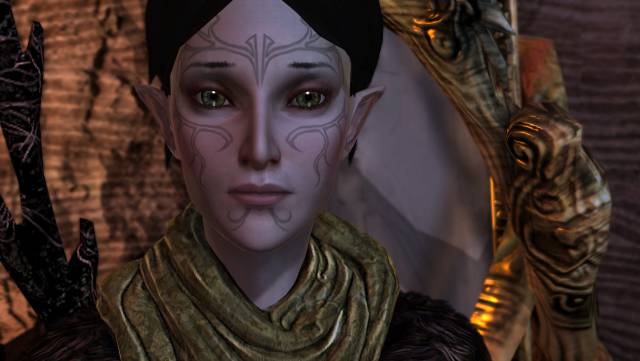 Merrill, blood mage who uses the forbidden magic for noble purposes.
Merrill, blood mage who uses the forbidden magic for noble purposes.
Freedom or ethics?
The magic in Thedas is a powerful instrument that, out of control, can lead to dire consequences. However, the institution of the Circle has not always fulfilled its well-intentioned purpose, and its operation is in conflict with the same desire for freedom of the human being: being a magician requires leaving one's own family to submit to the guardianship of a Chapel that profiles the sorcerers' own lifestyle, to the point of discouraging sentimental relationships – although love has ended up making its way into multiple enchanting hearts.
Morrigan, an apostate sorceress who is committed to individual freedom, contemplates magical learning from an ambition that she must not understand from external restrictions: “Magic thrives in its own use. A magician who fears her own magic is unable to master her. When the demons come looking for her, she will not have the strength to reject them. Circles are a cage built on fear. I don't know who are the dumbest: those who have built the cage, or those who let themselves be locked in it. ” (Dragon Age: The Last Court)
The Veil is not the only source of magic in Thedas; Blood magic, which requires a sacrifice – own or alien, lethal or not – can give very strong results, although it is persecuted by the Chapel itself due to its dubious ethics. However, even David Gaider himself raises the moral debate within his universe: "As a creator, I can go and say: 'Yes, blood magic is inherently evil,' but what does this mean? What is the nature of evil here? On a moral level, we mean? Do we contemplate evil as a corrupting influence, just like the dark beasts? There is evil and blood magic, as defined by the Chapel, magic that has to do with blood sacrifice and mind control. Blood magic goes much further: if you think about it, the use of phylacteries is a type of blood magic. The Initiation (of the Gray Guards) is another type of blood magic. So I think the thing is more about using this magic to do evil, but after all, it is a tool. (…) If you have something like blood magic, which is very easy to use for malicious purposes, which is the most common, it does present a very tempting path to evil. Does this mean that it should not be regulated, controlled or prohibited altogether? ”
The balance between the control of magic and the dignity of the magician, to fulfill the maxim of the Song of Light "magic exists to serve man, and never rule over him" has not always brought the happiness of all participants. A clear example is the case of Kirkwall, where the oppression against the magicians, exerted by the implacable Knight Commander Meredith, pushed them to take desperate measures. The apostate Anders begins a rebellion by exploding the Kirkwall Chapel, inside which was the Great Cleric. The war between wizards and Templars erupts, in which the First Charming Orsino and Meredith herself perish. Inspired by this act, Thedas Circles join the revolution. The Great Enchantress Fiona proposes to the College of Magicians, without success, the secession of the Circle and the Chapel. Meanwhile, libertarians bet on rebellion. The war, germinated in the events of Dragon Age II in Kirkwall, extends to Dragon Age: Inquisition, becoming the narrative core that coexists with the global threat of the open gap in the Veil.
Dragon Age, throughout his deliveries, raises the player from different prisms, embodied by such diverse characters that allow analyzing the conflict in his range of grays: Fenris, fugitive slave of Tevinter, who met his face Danarius in his face cruelest of magic; Cullen, the Templar who has witnessed the dangers of uncontrolled magic and, in turn, the abuse of power of the Templars; Merrill, a blood wizard who uses this tool for good, the aforementioned Morrigan, who defends the preservation of magic even if it does not adhere to ethics. As a good role-playing game, the player will decide which side to take through their decisions. Of course, as in a good grimdark story, the right paths will not exist, although all will provide a valuable lesson on the dilemma between responsibility and freedom.
“It is not that the Chapel wanted to incapacitate the magicians, they wanted them to have power to help humanity. But by choosing one thing, you lose the other. ” (David Gaider for Swooping Is Bad, 2012 interview).
 Meredith and Orsino, representation of the war between magicians and Templars.
Meredith and Orsino, representation of the war between magicians and Templars.

